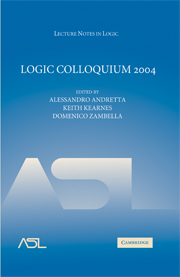Book contents
- Frontmatter
- Contents
- Introduction
- Speakers and Titles
- Abstract elementary classes: some answers, more questions
- On the density of Hausdorff ultrafilters
- Zero-groups and maximal tori
- Constructive set theory with operations
- Parametrized local zeta functions
- Colourings of hypergraphs, permutation groups and CSP's
- Tolerance intersection properties and subalgebras of squares
- Universes in type theory part I—Inaccessibles and Mahlo
- Hausdorff-dimension and weak truth-table reducibility
- Computation and the explanation of intelligent behaviours: ethologically motivated restart
- Constructible sheaves and definability
- An overview of modern universal algebra
- Lecture Notes in Logic
Abstract elementary classes: some answers, more questions
Published online by Cambridge University Press: 05 July 2014
- Frontmatter
- Contents
- Introduction
- Speakers and Titles
- Abstract elementary classes: some answers, more questions
- On the density of Hausdorff ultrafilters
- Zero-groups and maximal tori
- Constructive set theory with operations
- Parametrized local zeta functions
- Colourings of hypergraphs, permutation groups and CSP's
- Tolerance intersection properties and subalgebras of squares
- Universes in type theory part I—Inaccessibles and Mahlo
- Hausdorff-dimension and weak truth-table reducibility
- Computation and the explanation of intelligent behaviours: ethologically motivated restart
- Constructible sheaves and definability
- An overview of modern universal algebra
- Lecture Notes in Logic
Summary
Abstract. We survey some of the recent work in the study of Abstract Elementary Classes focusing on the categoricity spectrum and the introduction of certain conditions (amalgamation, tameness, arbitrarily large models) which allow one to develop a workable theory. We repeat or raise for the first time a number of questions; many now seem to be accessible.
Much late 19th and early 20th century work in logic was in a 2nd order framework; infinitary logics in the modern sense were foreshadowed by Schroeder and Pierce before being formalized in modern terms in Poland during the late 20's. First order logicwas only singled out as the ‘natural’ language to formalize mathematics as such authors as Tarski, Robinson, and Malcev developed the fundamental tools and applied model theory in the study of algebra. Serious work extending the model theory of the 50's to various infinitary logics blossomed during the 1960's and 70's with substantial work on logics such as Lω1, ω and Lω1, ω(Q). At the same time Shelah's work on stable theories completed the switch in focus in first order model theory from study of the logic to the study of complete first order theories As Shelah in [44, 46] sought to bring this same classification theory standpoint to infinitary logic, he introduced a total switch to a semantic standpoint. Instead of studying theories in a logic, one studies the class of models defined by a theory.
- Type
- Chapter
- Information
- Logic Colloquium 2004 , pp. 1 - 17Publisher: Cambridge University PressPrint publication year: 2007

